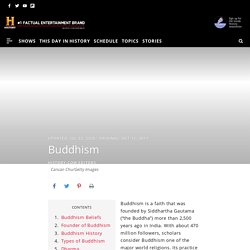

Religion and Science. 1.

What are science and religion, and how do they interrelate? 1.1 A brief history of the field of science and religion Since the 1960s, scholars in theology, philosophy, history, and the sciences have studied the relationship between science and religion. Science and religion is a recognized field of study with dedicated journals (e.g., Zygon: Journal of Religion and Science), academic chairs (e.g., the Andreas Idreos Professor of Science and Religion at Oxford University), scholarly societies (e.g., the Science and Religion Forum), and recurring conferences (e.g., the European Society for the Study of Science and Theology holds meetings every two years). The Most Important Deities in Hinduism. 9 myths about Hinduism — debunked – CNN Belief Blog - CNN.com Blogs. By Moni Basu, CNN [twitter-follow screen_name='MbasuCNN'] (CNN) - Caste.

Cows. Karma. Suhag Shukla knows that’s how some people outside Hinduism see her religion. Hinduism is ancient, though there is no specific date for when it was formed. Hotel Death: It's a place of celebration and salvation for souls In America, Hinduism’s profile was elevated by Indian immigrants who brought their customs and rituals with them and perhaps most recently, by the growing popularity of Hindu teachings like yoga and meditation.
Hinduism is the world’s oldest living religion and the third largest – behind Christianity and Islam – with more than 1 billion followers. And it remains a mystery for many. Myth No. 1: There are 330 million Hindu gods. Reality: There is one supreme God that cannot be fully known or understood. America's long and complex relationship with Hinduism. Last week marked the death anniversary of Mahesh Yogi, the Indian guru who brought transcendental meditation to the West in the sixties and became a spiritual teacher to The Beatles, comedian Jerry Seinfeld, and countless other celebrities.

Today, the legacy of the Maharashi, as he was popularly known, is evident in the widespread appreciation of meditation: Over 6 million people worldwide practice the technique the Maharishi introduced—transcendental meditation. An even larger number practice other forms. Health professionals and practitioners extol its many benefits, which range from anger management, lowered blood pressure and cardiovascular disease, reduced post-traumatic stress, and simply a healthier lifestyle. READ: Hinduism (article) Untitled. Hinduism - Origins, Facts & Beliefs.
Hinduism is the world’s oldest religion, according to many scholars, with roots and customs dating back more than 4,000 years.

Today, with about 900 million followers, Hinduism is the third-largest religion behind Christianity and Islam. Roughly 95 percent of the world’s Hindus live in India. Because the religion has no specific founder, it’s difficult to trace its origins and history. Hinduism is unique in that it’s not a single religion but a compilation of many traditions and philosophies. Hinduism Beliefs Some basic Hindu concepts include: Hinduism embraces many religious ideas. Hinduism Symbols There are two primary symbols associated with Hinduism, the om and the swastika.
The om symbol is composed of three Sanskrit letters and represents three sounds (a, u and m), which when combined are considered a sacred sound. Hinduism Holy Books Hindus value many sacred writings as opposed to one holy book. Islam - Five Pillars, Nation of Islam & Definition. Islam is the second largest religion in the world after Christianity, with about 1.8 billion Muslims worldwide.

Although its roots go back further, scholars typically date the creation of Islam to the 7th century, making it the youngest of the major world religions. Islam started in Mecca, in modern-day Saudi Arabia, during the time of the prophet Muhammad’s life. Today, the faith is spreading rapidly throughout the world. Islam Facts The word “Islam” means “submission to the will of God.”Followers of Islam are called Muslims.Muslims are monotheistic and worship one, all-knowing God, who in Arabic is known as Allah.Followers of Islam aim to live a life of complete submission to Allah. Muhammad. The Secret History of Muslims in the U.S.
Judaism: Founder, Beliefs & Facts. Judaism is the world’s oldest monotheistic religion, dating back nearly 4,000 years.

Followers of Judaism believe in one God who revealed himself through ancient prophets. The history of Judaism is essential to understanding the Jewish faith, which has a rich heritage of law, culture and tradition. Judaism Beliefs Jewish people believe there’s only one God who has established a covenant—or special agreement—with them. Their God communicates to believers through prophets and rewards good deeds while also punishing evil. Most Jews (with the exception of a few groups) believe that their Messiah hasn’t yet come—but will one day. Jewish people worship in holy places known as synagogues, and their spiritual leaders are called rabbis. Today, there are about 14 million Jews worldwide. Torah The Jewish sacred text is called the Tanakh or the “Hebrew Bible.”
Buddhism - Definition, Founder & Origins. Buddhism is a faith that was founded by Siddhartha Gautama (“the Buddha”) more than 2,500 years ago in India.

With about 470 million followers, scholars consider Buddhism one of the major world religions. Its practice has historically been most prominent in East and Southeast Asia, but its influence is growing in the West. Many Buddhist ideas and philosophies overlap with those of other faiths. Buddhism Beliefs Some key Buddhism beliefs include: Followers of Buddhism don’t acknowledge a supreme god or deity.
Christianity - Dogma, Definition & Beliefs. Christianity is the most widely practiced religion in the world, with more than 2 billion followers.

The Christian faith centers on beliefs regarding the birth, life, death and resurrection of Jesus Christ. While it started with a small group of adherents, many historians regard the spread and adoption of Christianity throughout the world as one of the most successful spiritual missions in human history. Christianity Beliefs Some basic Christian concepts include: